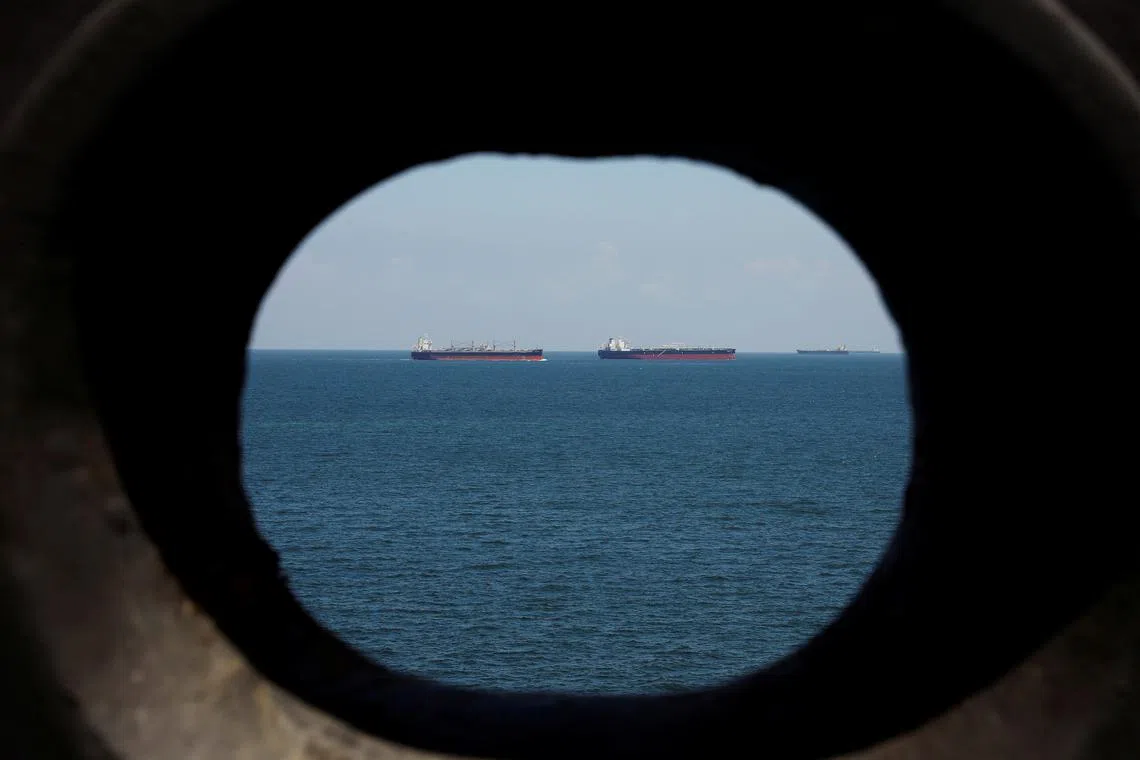Marine fuel sales at 12-month high as more vessels refuel in Singapore
Sign up now: Get ST's newsletters delivered to your inbox

Sales rose to 4.25 million tonnes in October, an increase of over 7 per cent compared with the previous month.
PHOTO: REUTERS
Follow topic:
SINGAPORE – Marine fuel sales in Singapore hit a 12-month high in October as more vessels called at the world’s largest bunkering hub to refuel, taking advantage of lower prices.
Sales rose to 4.25 million tonnes, an increase of more than 7 per cent compared with the previous month, according to data released by the Maritime and Port Authority of Singapore (MPA) on Sunday.
A total of 3,431 vessels called specifically to load bunker fuel in the Republic, an increase of nearly 9 per cent compared with September, and the highest number of vessels since April 2021.
Mr Yaw Yan Chong, director of oil research at Refinitiv, a unit of the London Stock Exchange Group, said aggressive selling by suppliers looking to clear inventories due to high financing costs resulted in attractive bunker prices for shipowners.
“The cost of financing inventories sitting in storage is getting more expensive, and traders do not want to keep rolling these costs from one month to the next, especially in an uncertain interest rate environment where we have seen frequent upward adjustments.
“Traders would rather sell as much as they can and limit the carry-on costs over,” said Mr Yaw.
He added: “There is also the element of the end-of-year closing of trading books, and unconsumed inventories are accounted as cost for traders. They do not want to carry this cost into their end-of-year P&L (profit and loss).”
Contributing to the expanded sales was the increase in marine fuels containing higher sulphur. MPA data showed that sales for the most commonly sought after high-sulphur marine fuel grade rose by nearly 18 per cent in October, compared with September, to 1.31 million tonnes.
A senior marine fuels trading manager at a large private trading firm, who declined to be named as he was not authorised to speak on behalf of his company, said the jump in sales of high-sulphur bunker fuel was likely due to the increase in cheap Russian fuel oil that had been indirectly finding its way into Singapore.
“Prices for high-sulphur bunkers are competitive also because there are traders blending cheap Russian components, which allows suppliers to offer good value to shipowners. This is definitely a factor for the big jump we see,” he said.
Refinitiv data for October showed that about 80 per cent of the fuel oil originating from Western sources that landed in Asia was made up of barrels from Russia.
“Most of this oil ends up going into floating storage tankers in southern Malaysia – and, to a lesser extent, Indonesia. The oil gets blended to on-specification high-sulphur bunkers, and is then either sold to shipowners via barges outside Singapore, or the finished product is shipped to commercial storage facilities in Singapore,” said Mr Yaw.
“There is no restriction on Russian oil flows into Singapore. I think that any restriction will be coming from commercial storage operators, who may be exercising caution over receiving and storing Russian oil in their tanks.”
Mr Yaw said he expects to see the trend continue in the lead-up to the Russian oil embargo, which is due to go into effect in December for crude and then in February for petroleum products.
Mr Roslan Khasawneh, a senior analyst at data analytics firm Vortexa, said a growing share of Russian residual fuel exports has been accumulating at deepwater anchorages just off Singapore in Malaysia.
This has helped push floating inventories of high-sulphur fuel oil in the area to about 1.4 million tonnes in mid-October – their highest since records began at the start of 2020.
Mr Khasawneh said high-sulphur fuel oil is typically used by ships with pollution-reduction equipment known as scrubbers.
Global regulations that came into effect at the start of 2020 forced the shipping industry to limit sulphur content in marine fuels to 0.5 per cent, from 3.5 per cent previously – unless they are equipped with scrubbers – in an effort to minimise emissions of the gas, which is harmful to humans and the environment.

